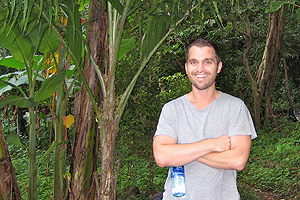Alumni
Fulbright Winner Built on Peace Corps Experience

Earlier this year American University celebrated a new school record with 14 Fulbright scholars and one alternate. Ben Williams’s experience in Nicaragua demonstrates the positive impact a Fulbright can have on both the winners and the world.
For Williams, SIS/MA ’11, seeing an economic concept at work was invigorating. The then-31-year-old California native returned in April from Managua, where he went on a Fulbright Scholarship to study the effectiveness of microfinance programs in both rural and urban populations.
“I was comparing client retention rates and loan payback rates between these two subsets to see if there were any factors I could isolate that would account for success,” said Williams.
He became fascinated with the subject when he served in the Peace Corps in El Salvador prior to enrolling in the international development master’s program at AU.
“I did a little work with a microfinance group [there], and I got to see how much potential there is for this idea in these small, underdeveloped communities,” he said. “The impact isn’t large when you measure it against our life here, but down there if you can buy an extra goat, or more chickens, if you can increase your assets even slightly it helps a lot.
“You have more collateral, you can get a bigger loan, or you can sell the cow and send your kids to school. There are lots of ripple effects.”
Williams knew he wanted to come to Washington for graduate school. He chose AU in part because “the access to faculty was outstanding.”
“Ben stood out,” said one of his professors, Daniel Esser. “His academic background from Berkeley is in literature, but he ‘gets’ social science. He would read an article or a book chapter and it would trigger a cascade of interesting, critical thoughts. He constantly questioned common wisdom. He is probably the most impressive MA student I've taught at AU thus far.”
Because most of his experience was in Latin America, Williams decided to reverse course and work in India the summer between his first and second years at AU. In the city of Bhubaneswar, on the eastern central coast, he wrote a 50-page report, “Urban Microfinance in Orissa: Key Challenges, Opportunities and Insights,” for the Madhyam Foundation.
“I worked six days a week and I lived above my workplace, so I had a lot of time on my hands,” he said. “I thought, you know what, if I’m going to sit around here with nothing to do I’m going to apply to everything. So I applied to Fulbright and a whole bunch of others.”
It was time well spent. Williams was one of three AU students to be awarded a Fulbright last year. He spent eight months in Nicaragua, where he found that microfinance programs were more successful in urban areas than rural ones.
“We think this has to do with migration patterns,” he said. “In Nicaragua the rural workers tend to have seasonal migration, and they go and work in the coffee fields in Costa Rica where they get paid a little bit more than they would in Nicaragua, and migrating is not such a harrowing experience as it is to the U.S. The money you get is less and you’re gone for a smaller amount of time.
“In the urban centers people tend to go to the U.S., and when they go to the U.S. they stay. They send money back — it’s steadier. What that means is the urban borrowers can take more risks. It’s just like here. If you know that for your first business idea, if you fail you can go home and live with mom and dad, go for it, right? If you don’t have that, you’re not going to take risks.”
Williams is in the process of finishing a paper on his research, a task made more difficult (in a good way) by the fact that he also received a Presidential Management fellowship. As part of the two-year appointment he’s working at the Department of Labor as a budget analyst.
“I’m learning skills that will apply if I want to go back into international development,” he said. “I think people who go in and start studying development initially think it’s about working with people on the ground, but it’s really about, at a higher level, finding sources of funding and managing funds.”
Williams may pursue a career in the federal government, or he may return to school to pursue a PhD. Whatever the future holds, he knows he benefited immensely from his Fulbright experience.
“It’s always great to be able to live in a place and have cultural experiences on a daily basis,” he said. “That’s always valuable in terms of personal growth, no matter what you’re doing, whether it’s Fulbright or something else.”
